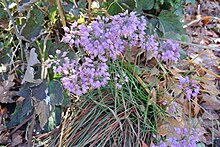
Pinus thunbergii, the black pine, Japanese black pine, or Japanese pine, is a pine tree native to coastal areas of Japan and South Korea.
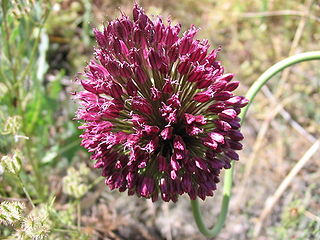
Allium sphaerocephalon is a plant species in the Amaryllis family known as round-headed leek, round-headed garlic, ball-head onion, and other variations on these names. Drumstick allium is another common name applied to this species. Some publications use the alternate spelling Allium sphaerocephalum. It is a bulbous herbaceous perennial plant.
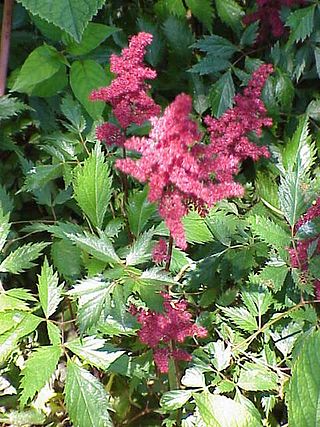
Astilbe is a genus of 18 species of rhizomatous flowering plants within the family Saxifragaceae, native to mountain ravines and woodlands in Asia and North America. Some species are known by the common names false goat's beard and false spirea.

Allium monanthum, the Korean wild chive, is a spring vegetable with minuscule bulbous roots that have a mild onion flavor and found in the woodlands of Korea, Japan, northeastern Russia (Primorye), and northeastern China.
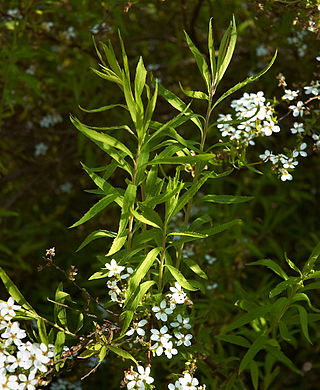
Spiraea thunbergii (珍珠绣线菊), Thunberg spiraea or Thunberg's meadowsweet, is a species of flowering plant in the rose family, native to East China and Japan, and widely cultivated elsewhere.

Dioscorea japonica, known as East Asian mountain yam, yamaimo, or Japanese mountain yam, is a type of yam (Dioscorea) native to Japan, Korea, China, Taiwan, and Assam.

Lespedeza thunbergii is a species of flowering plant in the legume family known by the common names Thunberg's bushclover, Thunberg's lespedeza, and shrub lespedeza. It is native to the eastern Himalayas, China, Korea, and Japan.
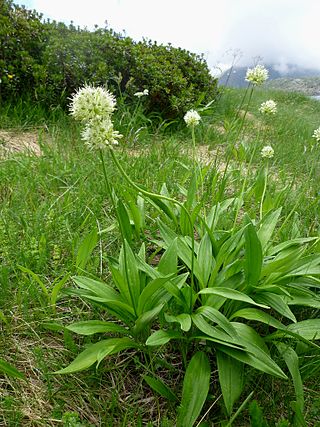
Allium victorialis, commonly known as victory onion, Alpine leek, and Alpine broad-leaf allium is a broad-leaved Eurasian species of wild onion. It is a perennial of the Amaryllis family that occurs widely in mountainous regions of Europe and parts of Asia.
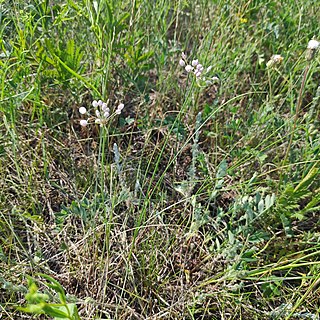
Allium anisopodium, also called thread-leaf chive, is a species of plant native to Siberia, the Russian Far East, Korea, Kazakhstan, Mongolia, and northern China.
Allium longistylum, also called riverside chive, is a species of wild onion native to Korea and northern China. It grows at elevations of 1500–3000 m.

Allium macrostemon, Chinese garlic, Japanese garlic or long-stamen onion, is a species of wild onion widespread across much of East Asia. It is known from many parts of China, as well as Japan, Korea, Mongolia, Tibet and Primorye. It has been collected from elevations ranging from sea level to 3000 m.

Allium maximowiczii, English common name oriental chive, is an Asian plant species native to Siberia, the Russian Far East, Mongolia, Japan, Korea and northeastern China.
Allium neriniflorum is a species of wild onion native to Mongolia, the Zabaykalsky Krai region of Siberia, and northern China. It grows on coastal sand dunes, wet meadows, hillsides, etc., at elevations up to 2000 m.
Allium plurifoliatum is a Chinese species of wild onion. It has been reported from Anhui, Gansu, Hubei, Shaanxi, and Sichuan at elevations of 1600–3300 m.

Allium ramosum, called fragrant-flowered garlic or Chinese chives is a northern Asian species of wild onion native to Kazakhstan, Mongolia, Siberia, the Russian Far East, and northern China. The species is also naturalized in a few places in eastern Europe. In its native range, it grows at elevations of 500–2100 m.

Allium sacculiferum, also called northern plain chive or triangular chive, is an East Asian species of wild onion native to Japan, Korea, eastern Russia, and northeastern China. It is found along the banks of lakes and rivers at elevations less than 500 m.
Allium spirale, also known as Korean aging chive, is a plant species native to Korea, Primorye, and parts of China. It is cultivated in many other regions and has for some reason obtained the common name German garlic. Other common names include spiral onion, corkscrew onion, and curly chives.
Allium tenuissimum is an Asian species of wild onion native to Mongolia, Asiatic Russia, Korea, Kazakhstan and China.
Allium koreanum, the Korean rocky chive, is a species of Allium endemic to the Korean Peninsula.

Eriocapitella japonica is a species of flowering plant in the buttercup family Ranunculaceae. The specific epithet japonica means "from Japan", which is a misnomer since the species is introduced in Japan. It is native to China, Taiwan, and Vietnam.
